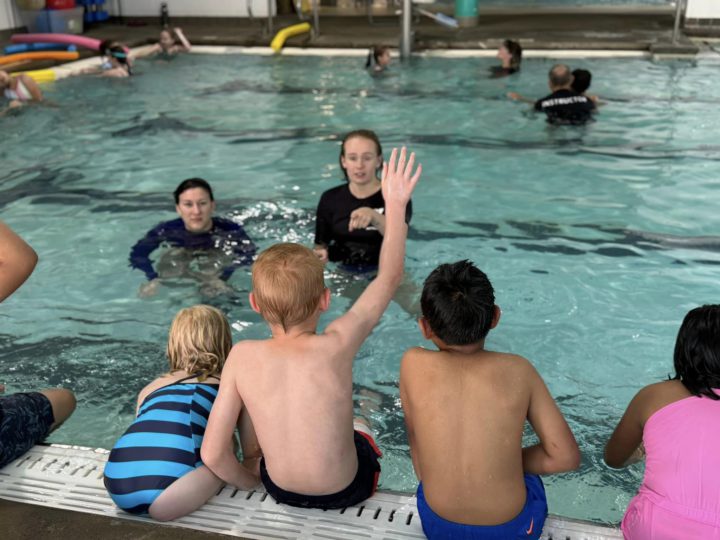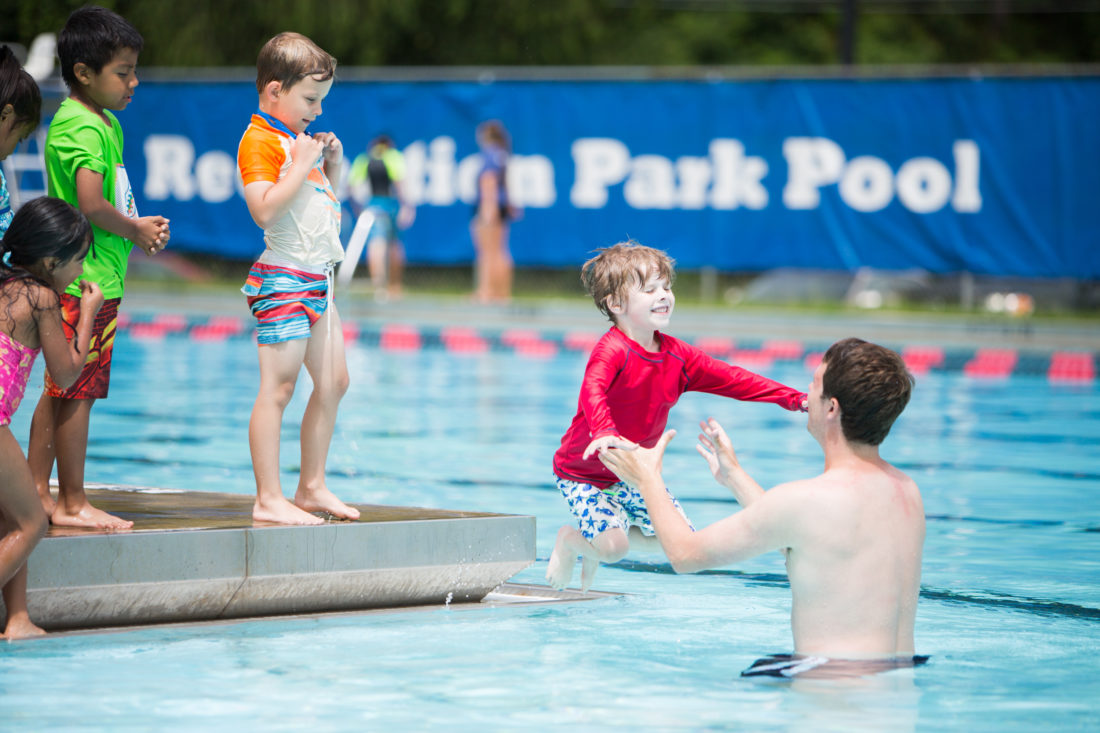Ask a parent about swimming lessons in Asheville and you’re bound to get an earful of complaints. Not enough public pools. Inconvenient class times. A lack of private instructors. Seemingly endless waitlists.
“Everyone is supremely frustrated with the lack of access to swimming pools,” says Amanda Wilde, a West Asheville mother of an 8-year-old girl. “You’re just not able to give your kids any kind of freedom because they don’t have anywhere to learn. It’s important to learn how to swim, and I would love to see more interest in it and not treating it just like it’s some luxury item.”
The issue of access was compounded by two recent pool closures. In February, the City of Asheville announced its outdoor pool in Malvern Hills Park would not open this year so city staff could address maintenance needs. Wilde’s daughter took lessons there in previous summers. And the Asheville chapter of the YWCA, facing major financial woes, has temporarily closed its pool for maintenance and repairs. With one of the few indoor pools in Asheville, the YWCA has offered year-round swimming instruction for children for nearly 50 years.
“There are very few windows in the year where we’re not doing lessons, because we know that the demand is so high,” says Diana Sierra, CEO of the YWCA of Asheville. “There is a significant need for pool access for all members of our community.”
Indeed, the need for an indoor aquatics facility with true public access ranked high when the City of Asheville solicited public input for its updated comprehensive recreation plan, Recreate Asheville, says Christo Bubenik, marketing and communications manager for the Parks & Recreation Department. The city got similar input when it developed earlier iterations of the plan in 1998 and 2009, he says.
Health experts and parents say learning to swim can be a matter of life and death. Drowning is the No. 1 cause of death for kids 1-4 years old in the United States, according to the national Centers for Disease Control and Prevention, which says formal swimming lessons can reduce that risk. The CDC also points to the physical and mental health benefits of water-based exercise.
“I am always on high alert if there’s water and there are little kids around,” says Asheville’s Katie Nehling, mother to two daughters, ages 3 and 5. “It’s not like we’re in Florida or at the beach where everybody has a pool. But we are around several bodies of water. There’s the French Broad River, there’s the Swannanoa River, there are creeks, there are lakes.”
Public and private groups that offer swimming lessons are sympathetic to the concerns of parents and are searching for solutions, including training more people to be qualified instructors. But until more public pools — especially indoor pools — are opened in Asheville, the problem isn’t likely to get much better.
Year-round options lacking
This summer, the City of Asheville has offered three one-week swimming lesson sessions at its outdoor pools at Recreation Park in East Asheville and the Dr. Wesley Grant Sr. Southside Community Center. The free lessons were held twice a day, at 10:30 a.m. and 6 p.m., to children ages 3-10. Despite the closing of Malvern Hills Pool, the city served 100 children this year, an increase over 2022 and 2023.
“We were able to shift all the water aerobics classes that would have been there [at the Malvern Hills pool], the swim lessons and all that stuff,” Bubenik says. “So everybody still has the same opportunity. We haven’t cut anything.”
But Wilde says those two pools are not as convenient for her as Malvern Hills and lack the community feel her kids got by being around neighbors. And, she adds, one week of lessons over the summer doesn’t make much of an impact.
“Your kids tend to forget everything they learned over the winter,” she says. “And they are starting all over again from scratch every summer.”
Outside city limits, Buncombe County offers summer lessons at five outdoor pools. But it doesn’t make lessons available at the $6.25 million indoor Buncombe County Schools Aquatics Center, which opened at T.C. Roberson High School in 2019. That facility is mostly used by local middle school, high school and private school swim teams and for community rentals.
That means year-round lessons in Buncombe County are available only at membership-based locations like the YMCA of Western North Carolina, the Asheville Jewish Community Center, the Country Club of Asheville and two Asheville Racquet Club locations. The YWCA, which was on the list, will not be able to offer swimming lessons again until the beginning of next year at the earliest.
Many of those private swimming lesson options are expensive and require long waits to find slots, parents say.
Some parents try to secure lessons for their children with private instructors, but find that can difficult — and pricey as well.
“We ended up being able to book semi-private lessons with a local swim teacher who hosted swim lessons at the Asheville Racquet Club over here in West Asheville,” says Leah Carpenter, a mother of two boys, ages 5 and 3. “That teacher was a great teacher, but then they kind of were just unavailable; it was just hard to get ahold of them. And from what I could gather, it was due to lack of a pool to host lessons in.”
Adds Nehling: “I will pay good money for someone to teach my child how to swim, and I can’t find anyone.”
Nehling’s 5-year-old daughter is about to start kindergarten at Rainbow Community School, where she will have swim instruction over the winter. But Nehling recognizes that not everyone has the ability to send their kids to private school.
“I’m a white, privileged person trying to get my kids to take lessons and I can’t. I can’t even imagine not having the money and the resources to expose my kids to that kind of stuff,” Nehling says.
Staff shortages
The YMCA of WNC is by far the biggest provider of swimming lessons in Asheville.
The Y offers instruction for children ages 6 months to 15 years at its indoor pools at two Asheville branches, the Reuter Family YMCA in Biltmore Square Park and the downtown branch on Woodfin Street. Most sessions are once a week for seven weeks, although some twice-a-week sessions are available in the summer. From October 2022 to September 2023, the Reuter branch taught swimming to around 1,050 people, while the downtown branch served about 850.

Y members pay $84 per session while nonmembers pay $130 per session. Students who qualify for financial aid for their Y membership automatically qualify for financial aid for swim lessons.
“We definitely have limitations around availability of classes because we do end up with waitlists pretty often,” say Mallory Ament, aquatic senior program director. “We’re doing a lot of work on our end to problem solve that and come up with creative solutions that we can start offering.”
One of those solutions is cross-training employees to address a shortage of qualified swim instructors.
“It’s a pretty niche job,” Ament says. “You need to be able to not only swim but know how to teach kids in an environment that kids can be really nervous around. So if you are a lifeguard, we’re encouraging you to learn to become a swim instructor. Or if you’re working at our front desk and you like working with kids or in our youth development center, we’re also offering training.”
The Y has had some success so far getting staff interested in the training, particularly at its smaller facilities outside Asheville. “We’re working on getting that at our larger centers as well,” she says.
Ament points out that the YMCA of WNC has locations in Black Mountain, Hendersonville and Marion that offer swimming lessons but typically don’t have long waitlists. People willing to drive a little may have more success finding lessons, she says.
Funding needed
The YWCA, meanwhile, typically offers six- to 10-week swimming sessions to about 170 children per year at its South French Broad Avenue center. Prices for each session range from $72-$108 for Y members and $90-$130 for nonmembers.
In 2024, 53 people who took swim lessons were on scholarship due to financial need, according to Catalina Slater, YWCA director of marketing and communications. “We really believe that an important part of our mission is to remove those barriers,” CEO Sierra says.
But the nonprofit will be out of the swimming lesson business until it is able to raise money to make repairs to the ceiling of its indoor pool, which opened in 1975.
“It’s a concrete ceiling system that has been impacted by decades of humidity,” she says. “We have one of the warmest pools in town, and that humidity, having been left unaddressed, has really taken a toll on our ceiling.”
The YWCA estimates the repairs will cost $200,000, though it will not know the final figure until a structural engineer does an estimate. That expense comes at a time when the organization is already facing budget deficits caused by lingering economic effects of the COVID-19 pandemic, inflation and shifts in funding priorities.
Sierra doesn’t have a firm reopening date for the pool but hopes it will be early 2025.
When the pool reopens, it will be under new leadership. Aquatics director Kitty Schmidt retired after 25 years and will have to be replaced.
“We are eager as an organization to reopen stronger and better than ever,” Sierra says. “We are talking about potentially even creating opportunities for expanded programming and more swim equity and swim scholarships. But none of that can happen until we address the repair.”
Misti Chastain‘s 6-year-old son was one of the children who took lessons at the YWCA. She’s not certain what she will do while the pool is closed.
“They [the YWCA] are the reason he learned to swim as well as he did,” she explains. “And if it hadn’t been for the scholarship, he wouldn’t have been able to do swim lessons. As a single parent, now that the Y’s closed, he can’t go swim anywhere because I can’t afford swim lessons.”
It’s a frustration felt by other parents throughout Asheville as they search for swim instruction options.
“Where are all the people who can teach swim lessons?” Carpenter wonders. “Why is that so hard? We have tons of families here. Why isn’t it just a normal part of family’s bringing up children here in Asheville?”




Before you comment
The comments section is here to provide a platform for civil dialogue on the issues we face together as a local community. Xpress is committed to offering this platform for all voices, but when the tone of the discussion gets nasty or strays off topic, we believe many people choose not to participate. Xpress editors are determined to moderate comments to ensure a constructive interchange is maintained. All comments judged not to be in keeping with the spirit of civil discourse will be removed and repeat violators will be banned. See here for our terms of service. Thank you for being part of this effort to promote respectful discussion.